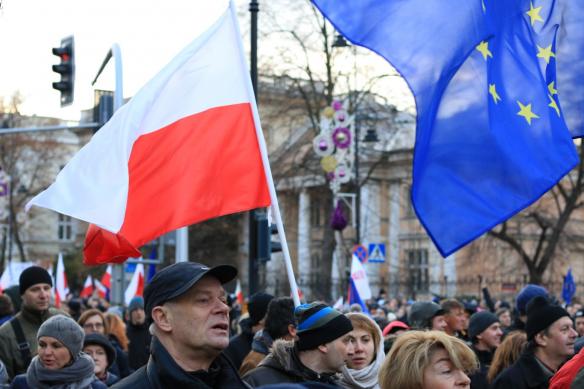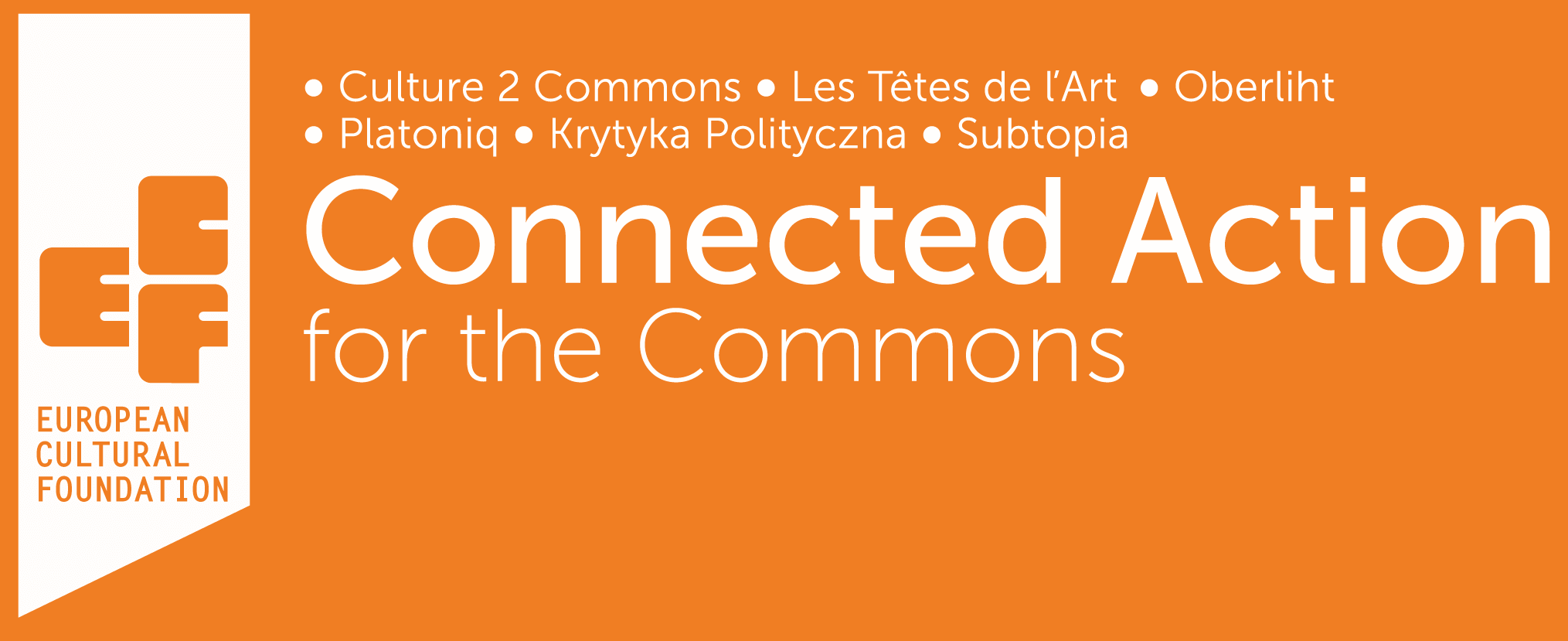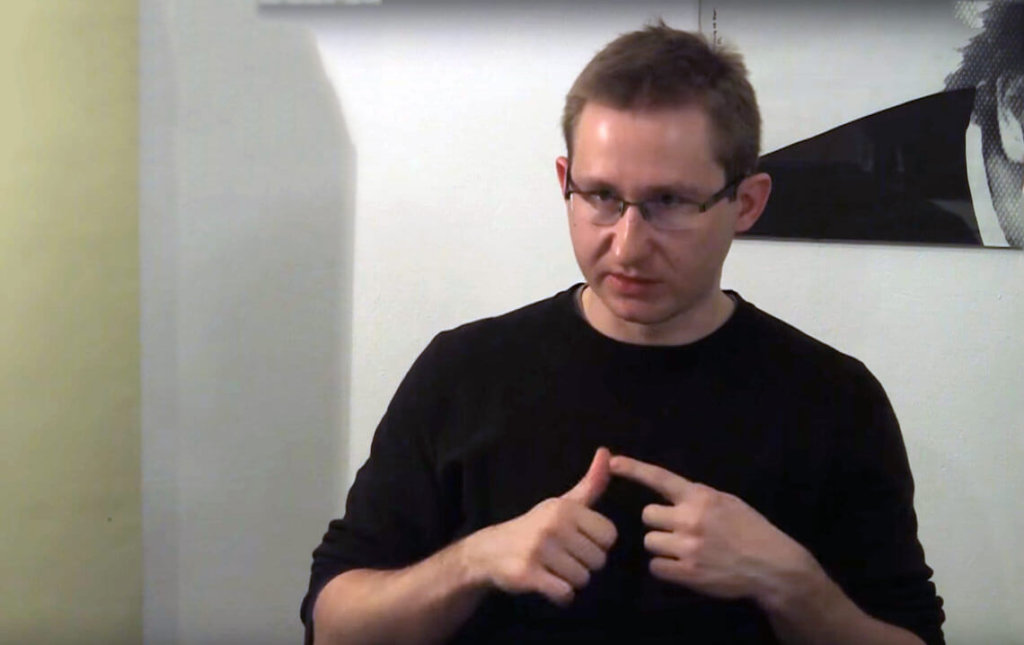by Thijs Kleinpaste
This article was originally published (in Dutch) in Groene Amsterdammer on Wednesday 13 January, 2016 (English translation: Daniel Naamani)
‘The idea of the engaged intelligentsia is an Eastern-European invention; their ethos is very important to me, and we need them more than ever.’ Sławomir Sierakowski, Polish intellectual and activist, is involved with the protests against the dictatorial tendencies of Jarosław Kaczyński’s party Law and Justice (PiS), which gained an absolute majority in the Sejm, Poland’s parliament.
The reactionary Right reigns supreme in Poland. What does it mean to be leftist in such a climate? Sierakowski does not despair. He compares the position of leftist intellectuals and political activists with that of the democratic intelligentsia in nineteenth-century Tsarist Russia.

Photo by Marta Modzelewska via Political Critique
“We are Turgenev’s superfluous people”
Sławomir Sierakowski is a radical political thinker, although his radicalism is mostly thrown into relief by the political stream he is swimming against. He trained as sociologist under Ulrich Beck and was a visiting fellow at American universities like Princeton, Harvard and Yale. He wrote numerous essays and had a column in The New York Times until a year and a half ago. In his homeland Poland he is founder and editor-in-chief of Krytyka Polityczna, a Polish publication of like-minded left-wing intellectuals and activists. The organisation also has cultural centres in Poland and beyond (in the Ukraine, for example), a publishing house that is predominantly devoted to translating (political) treatises from and into Polish, and even community services, such as a crèche.
Sierakowski’s career was given a big boost following his 2003 initiative to publish an open letter addressed to the general public of Europe, in which he spoke out on behalf of a large group of intellectuals and activists on the European Constitution, which was then being drafted. It was Sierakowski’s view then that his pro-European group wasn’t represented by the conservative Polish government. In a Europe that was moving towards an increasingly tight-knit union, Poland should not be allowed to play the role of an obstructor against further integration, ‘a symbol of conservatism and particularism.’
Thirteen years later, Poland has become precisely that symbol of conservatism. Ever since the Polish government’s attempts to impose restrictions on the independence of public broadcasting and to render the Constitutional Tribunal toothless, Sierakowski has been busier than ever.
As early as October, shortly after PiS’s landslide victory, Sierakowski predicted that Kaczyński would launch an attack on the justice system and the media, but also said that Poland hadn’t quite turned into Hungary yet. The PiS, propelled to prominence by anti-immigration rhetoric, should be seen as a run-of-the-mill extreme right-wing European party: the ‘ironic result of Poland’s integration into the West.’
By now the situation has changed. Kaczyński has done what Sierakowski predicted, but more thoroughly than expected. Sierakowski now writes: ‘Kaczyński has started a war against the liberal democracy. He operates faster than Orbán and Erdoğan. We must organise a united front. The primary battlefield will be mass media and the streets, where for the first time since the end of the Soviet era people are participating in mass demonstrations again. The public broadcaster has been commandeered and in the meantime the government is trying to muzzle the other media too. Kaczyński is squeezing subsidies for organisations that do not conform to his will, starting with Krytyka. It saddens me that this is happening, but I also feel more than ever that I’m in the right place, fighting for my ideas.’
For the first time in post-communist Polish history, not a single left-wing party is represented in parliament. It makes the position of the Left in Poland a thankless one, and that of thinkers like Sierakowski even more so. What to do now? And why are the (extreme) right parties so successful across Europe?
‘There are a number of factors at play,’ says Sierakowski. ‘There are long-term tendencies such as the disappearance of the differences between mainstream political parties. The differences between parties in the political centre have evaporated. The consequence is that people start looking for a difference, because they want to have something to choose. If they get the impression that there’s nothing to choose, people don’t feel like they’re true citizens. Take the last European elections: why did a quarter of all Europeans vote for a party on the far right? It’s because the establishment parties have already more or less decided on everything before the elections: who will be the European Commissioners, who will supply the President of parliament, and so forth and so on. How does that make people feel, on their way to the polling booth?
“I would give up a lot to have people like Václav Havel around again today, but he too would lose the elections.”
Then there is also a big crisis on the Left, Sierakowski suggests: ‘Even when left-wing parties do win elections, they are still forced to carry out right-wing policies. Syriza is the best example of this: a radical left-wing party that has to implement a far-right economic programme. Social-democratic politics have simply become impossible on a national level. People see that, even if they vote left-wing, this still doesn’t result in any left-wing policies, and what is left for them then? Frustrations like these are not easily dispelled.’ He cites the ongoing refugee crisis as the third factor: ‘Where refugees are taken in, the extreme right’s results double. Europe is extremely rich, but is apparently unwilling to share that wealth.’
Sławomir Sierakowski is without a doubt a political radical, but he’s also a calm radical. His tone is almost neutral, as if he’s simply listing the facts as they are. He doesn’t want to be called a pessimist, he isn’t bitter. His demeanour emanates a calm acceptance of reality by somebody who indeed has ideals, but is otherwise completely free from illusions or false hope.
‘I’m not a pessimist. I’m realistic about the present circumstances and optimistic about the solutions. Of course, you could say that I’m disappointed with the current politics of the Left. That is the reason why I haven’t stayed under the umbrella of party politics. These institutions will continue to exist for a while, but they’re slowly withering away. Party politics is not a synonym for democracy. It was invented in the nineteenth century and can just as well disappear again and make way for something new. Political parties aren’t the rooted organisations they used to be, and we’re now seeing the effect of this in the parties we have left: there is a strong negative selection. We no longer see any real decisive leaders like we had fifty years ago. It’s the “Berlusconisation” of politics. I don’t think it will get better.’
In response to the argument that parliamentary politics has always had a close relationship with party politics, Sierakowski says that his goal isn’t to reject democracy itself. ‘I’m wary of upsetting the fragile system of democracy. Nobody has ever come up with anything better, but we have seen a lot of worse things. What I propose is that we perhaps need to look for party politics on a higher level, but that seems impossible in these circumstances. We are being dominated by the shitty culture of narcissism propagated by little nations, including Poland. This culture is given new impetus by political parties that are playing the ‘national culture’ card as a way of solving things. The problems of nation states are brought on by their own inefficiency, and nationalist parties promise to solve them by appealing to the idea of national pride or purity, with no refugees or ‘other people’. This is our dilemma. People have stopped believing that things can change. Politics has turned cynical and this made society cynical too, so we shouldn’t be surprised that people are behaving selfishly. I would give up a lot to have people like Václav Havel around again today, but he too would flat out lose the elections in this day and age.’
Middle-class philosophies are in crisis, says Sierakowski, and that’s why an alternative strategy is essential. In order to find pegs to hang that strategy on, he looks back to the past, among other things to the life and work of Polish literary critic Stanisław Brzozowski. Krytyka and Sierakowski derive their political ethos from this Polish intellectual. Brzozowski (1878-1911) was a Marxist literary critic, writer and essayist. He died at the age of 33 of tuberculosis, but had by that time already written several books and hundreds of essays. Nearly every Polish thinker of any consequence has written about him. Leszek Kołakowski discussed Brzozowski extensively in his substantial History of Marxism; Czesław Miłosz was his literary biographer. Historian Andrzej Walicki described his vision as deeply-ingrained individualism, and a Promethean Marxism which puts mankind at the centre instead of materialistic dialectics.
Brzozowski was a fundamentally eclectic thinker and placed great emphasis (as did the great Russian thinkers of the nineteenth century before him) on the duty of the intelligentsia to push for the liberation and elevation of the working class. Fifteen years ago, Krytyka started out with a seething j’accuse that denounced the tired and quotidian political culture of Poland. Its title: ‘Intelligentsia: helpless or dead?’
Brzozowski belonged to the Eastern-European intelligentsia that hoped to carry out the task they set themselves, to go to the people. Sierakowski: ‘He was an exceptionally engaged person. He worked himself to the bone, as a writer, as an intellectual and as an activist. He was a fascinating individual. Somebody once described his work as “philosophical vodka”, but his philosophy is deeply humanist. All Polish dissidents during communism, including Miłosz, were influenced by him.’
Brzozowski’s influence can also be felt today. ‘It’s the intelligentsia’s duty’, says Sierakowski, ‘to once more “go back to the people”, as it was called in the nineteenth century. We are living in an atomised world, so what do we need? Binding agent. If people are to get back to solving problems together, there needs to be commitment.’
Krytyka is part of a long Eastern-European tradition, Sierakowski continues, which Western Europeans don’t always find easy to comprehend. ‘The word “intelligentsia” originated here in Eastern Europe, in the mid-nineteenth century. The existence of the intelligentsia is a symptom of backwardness. These people wanted to compensate for the lack of strong institutions, institutions that the West did have: cities, universities, state-run institutions. In Poland’s case, there wasn’t even a state. So if people wanted an enlightened society, or if they wanted to stand up for labourers or women’s rights, it was essential to have a group of dedicated people who were willing to devote their existence to the realisation of their ideals – a classic job for the intelligentsia.’
“The goal of the intelligentsia should be a kind of successful suicide, that is to say: to eventually become obsolete”
With not a single leftist party represented in the Polish parliament, there is a need to fall back on alternative, extra-parliamentary organisation. ‘The Left in Poland is in difficulty because their body of ideas is still based on post-communism, which is essentially a reincarnation of the old idea — more democratic, and generally better than under the former communist regime, but still outmoded and not “left” in the modern sense of the word. Who joined the communist party in the nineteen-eighties? They weren’t left-wing people, their motivation was different: power and status, influence.’
Like most countries from the original Soviet bloc, Poland was extremely illiberal, Sierakowski contends, a direct result of the communist era. ‘Communism functioned as a deep freeze. People awoke at the beginning of the nineties without having experienced the slightest influence of feminism or the gay movement, so even a lot of the left-wing dissidents were still quite conservative socially speaking. To let new ideas catch on, you need to organise people, engage in conversation with them, and persist. First they’ll laugh at you. Then they’ll laugh at you again. Then they’ll still be laughing at you. But in the end, if you survive and are still standing, after considerable time you will be able to convince people.’
This emphasis on constant organisation – a process that takes place completely outside of the parliamentary context – is fundamental for the task Sierakowski sees for Krytyka: ‘If you work with people for years on end, especially outside of the big cities, you have to be committed. It eats up a lot of energy, but in the end you will succeed because you have been able to create common experiences. The first job at hand is to form a powerful committed citizenship. The higher levels can reform the basis, later Marxists were right when they identified the public discourse as an important tool to change society.’
Bearing Brzozowski in mind, Sierakowski believes that this job is one pre-eminently suited to artists, musicians and writers. It is the duty of the intellectual and writer, Brzozowski thought, to speak out for a better society, to stand up for individualism. From an early age onwards, Brzozowski was fascinated by Russian nineteenth-century literature and the ideas that were dicussed by writers like Dostoyevsky. In response to the latter’s novel Demons, Brzozowski wrote his own novel, Flames, in which he challenged Dostoyevsky’s gloomy worldview and launched an attack on the remains of feudal conservatism, tradition, clericalism and capitalism.
But what if Dostoyevsky’s ultimate vision about mankind were closer to the truth than the individualistic or humanistic left-wing ideal? What if people, after having laughed a fourth time at the activists who “go to the people”, keep laughing? What if they don’t want to be free in the way that others have in mind for them?
‘I consider Dostoyevsky as the most important challenger of left-wingers anywhere’, replies Sierakowski. ‘If you think you are left-wing, of if you want to be left-wing, you have to be willing to hold your ideas up to Dostoyevsky. He is a test. Look at Notes from Underground, and look at the bigger discussion that book was part of, between Chernyshevsky (with What Is to Be Done), Turgenev (Fathers and Sons) and Dostoyevsky himself.’
The discussion that plays in the background in the works of Dostoyevsky and Turgenev was sparked by Chernyshevsky, who had sketched a rationalist utopia in What Is to Be Done, to benefit the Russian rural proletariat. Turgenev called his views nihilism and Dostoyevsky, for his part, struck back with the Underground Man. No matter how beautiful and salutary, how sensible the utopia is made out to be, the underground man doesn’t care for it – the only thing he holds on to with all his might is his autonomy, which is worth more to him than any plan or programme could ever be. That the price for his autonomy is great unhappiness doesn’t bother him; at least it’s his unhappiness. ‘In his Notes from Underground Dostoyevsky essentially argued that rational utopia probably doesn’t bring freedom. For myself the lesson is also that one should, ultimately, believe. When it comes down to it, you can’t let your ideas rest on some scientific groundwork. This also means, by the way, that you always have to be a bit suspicious of yourself.’
Turgenev belonged to the superfluous generation. The generation that did have some abstract ideals, but that ran up against the tyranny of Tsarist Russia. Sierakowski: ‘Today’s intelligentsia feels the same way. We are the superfluous people Turgenev wrote about. The goal of the intelligentsia should be a kind of successful suicide, that is to say: to eventually become obsolete, because society can solve its own social problems.’
The main thing is, in a word, dedication. Sierakowski quotes Brzozowski one last time. ‘He wrote: “What is not biography, is nothing.” This means that ideals are realised by living them. Through patience, mistakes, persistence and repetition. It’s the idea that you can’t fall back on abstract ideas without taking reality into account. You have to be sceptical. Whenever you try to implement abstractions – whatever they are: socialism, feminism – it always creates problems, and sometimes atrocities. Only shared experiences, political experiences, can cause people to change. Those who want to save politics should counter atomisation, and this means that connections between people need to be cultivated. That is the most effective antidote against distrust and cynicism – and we know: those two things are the main obstacles to reclaiming democracy.’
Further reading:
- The Polish Threat to Europe by Sławomir Sierakowski (published on 19 January 2016 in Project Syndicate)
- Sierakowski: No Freedom Without Solidarity! [Interview] (published on 22 January on Political Critique’s website)

